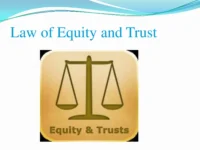Equity Law: Common Practice

Equity is a component of the legal system to which a number of principles are attracted. It is based on a legal concept known as justice. It exists both in common law and civil law systems, and even in international law, particularly in Roman law from the third century up to the sixteenth century. The origin of equity comes from ancient Aristotle and from Roman law, especially from the time of the Republic. This principle is also called equity of force or just compensation.

In order to judge equity, courts decide whether the defendant has been fairly compensated for the loss or damage that he has suffered as a result of another’s wrongdoing. A common law court will hear arguments concerning whether or not the defendant has been sufficiently compensated. If no adequate compensation can be found, then the matter will be judged on other bases, including an estimate of future income and assets. These decisions become part of judicial law and are generally referred to as equity judgments.
In the United States, equity law issue cases are decided by district courts. District courts must be located within the jurisdiction of the United States Supreme Court. Many equity issues will touch on issues that are not clearly a question of federal law, such as state laws that apply to death claims or property interest (land and intangible personal property). These cases are heard before the courts of general jurisdiction, which is what are called county courts. But they are subject to the decisions of the federal court, which usually have concurrent authority.
The courts may exercise one of several remedies to remedy an imbalance that has occurred: award damages in an amount that is fair to the injured party; require the defendant to compensate for past and future injuries, including lost wages and medical expenses; or order a person to pay taxes. An equity complaint may also be based on a breach of a contractual obligation, a violation of public trust, or a deprivation of property or opportunity. Some of these allegations may be based on a statute law that is more limited than the common law. An example of this would be the wrongful death claim often brought forward by relatives in family disputes. Inequity actions, there may be a constructive trust, or a device, or a contract that specifically provides for the transfer of a particular asset.
Equity complaints are generally governed by the equity maxim: Prima facie; that is, if there is a reasonable basis for suspecting wrongdoing, a Prima facie action is justified. However, the courts have the option of applying one of several common law remedies. One of these remedies is the judicature clause; that is, they may refer the case to a jury. It should be noted that the jury’s role is to determine the guilt of the accused rather than try and act.
Another remedy referred to inequity actions is the rescission clause. With the rescission clause, if the party against whom an action has been filed withdraws the action, then the plaintiff is released from his or her remedy. These remedies are referred to as “common law remedies.” However, there are two significant limitations on the use of such remedies.
First, it should be noted that, depending on the circumstances of a particular case, there may not be a common law remedy available to an individual who has been accused of equity fraud. Second, even if a remedy is found, it may only be enforceable if it is contained within a written contract between the parties. As discussed earlier, in many equity actions, contracts are required. This is because equity fraud often involves the concealment or misrepresentation of information or an inability to make an accurate accounting.
If you have been accused of this crime, it is important that you seek the help of an experienced attorney with experience in equity and other civil court matters. An equity lawyer will be able to evaluate your case and determine the best course of action for you. A skilled court lawyer can also ensure that your rights are protected and that you receive the full amount of compensation that you are entitled to.





